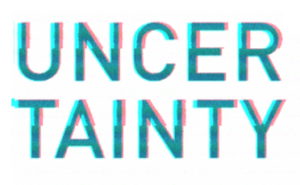Uncertainty is a concept that defines our times. Every media headline seems to assert that things are uncertain, and increasingly so. Whether it’s climate change, disease outbreaks, economic conditions or political settlements, the same narrative exists.
Helga Nowotny, in her book The Cunning of Uncertainty, argues that “uncertainty is written into the script of life”. But how should we understand ‘uncertainty’, and why does it matter? Are we equipped for responding to seemingly accelerating uncertainties across different policy domains?
Beyond risk
A conventional, managerial and technocratic approach is to construct such challenges as risks – where the probabilities of future outcomes are known, or at least can be estimated. The paraphernalia of risk assessment and management are familiar, derived from engineering approaches. These approaches are good for some cases, such as designing a bridge or road, but not for others, where complex socio-ecological dynamics are involved.
In fact, it can be dangerous to assume risk, in situations where uncertainty – or indeed ignorance – prevails. Framed by a risk-based approach, our institutions and policies are often poorly equipped for our uncertain world. A risk-focused stance suggests that the future is controllable and that a modernist vision of progress is achievable, if only effective science and technocratic institutional control are applied.
Embracing uncertainty, however, suggests a rather different outlook on the pressing challenges of sustainability and development, where a more tentative, adaptive, improvised approach becomes essential.
Questions for uncertainty
During 2019, the STEPS Centre’s thematic focus is Uncertainty. Through a series of discussion events across the year, we will be exploring the implications, relating to experiences from different fields. Connecting disciplinary and practical perspectives, we hope to challenge our preconceptions and enrich our intellectual capabilities, aiming to map out the contours of an approach to contemporary challenges that truly takes uncertainty seriously.
A focus on uncertainty raises some fundamental and challenging questions, which we will be debating throughout the year. Here is a selective sample of themes and questions that we want to debate:
- Alternative visions: If a focus on uncertainty undermines a narrow, modernist view of progress and development, what alternative visions of modernity are opened up? Does the framing of the ‘risk society’ developed in northern Europe, for example, make sense in diverse cultural contexts? How are multiple modernities constructed through different cultural responses to uncertainty, informed by diverse social imaginaries of the future? What do these culturally-located perspectives suggest for debates about directions of progress and sustainability?
- Science and policy: When we don’t know what we don’t know, and where ‘not knowing’ is a pervasive feature of engagement with the world, what does this mean for science and for policy? How do the features of indeterminacy, ambiguity and surprise intersect? What blind spots, biases and ‘wilful blinkers’ affect our understandings? Can we make use of practical heuristics and rules of thumb to help navigate uncertainties, using principles of ‘optimal ignorance’? What does this imply for a more open, tentative, humble practice of science and policy appraisal?
- Distribution and justice: If the impacts of diverse risks and uncertainties are unevenly felt, what are the implications for how risks and harms are distributed by class, gender, race, age and location? What therefore are the political ecologies of uncertainty, and the implications for differential accumulation and social differentiation, and so forms of accountability and meanings of citizenship in a new politics of uncertainty?
- Ecologies: When natural hazards and human impacts are inevitably mutually constituted, with multiple intersecting agencies of both human and non-human actors, what are the implications for a politics of sustainability that doesn’t defer to externalised hazard, emergency or disaster, but must respect deeply intertwined, co-constructed socio-ecologies, where notions of singular, directed ‘human control’ are rejected?
- Governance: When the world is simply not controllable and conventional institutions and policies not up to the task, what alternative forms of governance become appropriate? How do ideas of experimental, adaptive, networked, reflexive governance interact, for example? How might a more open, collaborative, mutualistic and collective set of arrangements facilitate democratic responses to uncertain and unruly challenges?
- Methodologies: What methodological responses are suggested, which allow for an opening up to uncertainty? Can styles of experimentalism, citizen participation, transformative action and ‘post-normal’ science assist in revolutionising methodologies for science and policy that take uncertainties seriously? Can an embrace of uncertainties generate new forms of hope and the possibility of action, creating a new politics of sustainability and development?
These are all huge questions, resting on big debates that are all fundamental to our collective futures. This list, of course, represents only some of potentially many other questions that arise when we contemplate the important implications of embracing uncertainty. Above all, an intellectual and practical humility is required, with dominant visions of modernity and progress challenged and alternatives explored.
Each of the questions above does not stand alone: they are deeply linked. Whether we are thinking about questions of financial systems, critical infrastructures, climate change, infectious disease control, migration policy – or indeed many other domains where conditions of uncertainty prevail – these debates have huge implications for the practices of science, management and policy. In turn, this has consequences for how institutions and governance arrangements function, opening up many questions about how we navigate the world under conditions of uncertainty.
During 2019 at the STEPS Centre, we will be debating these issues – and more – so please come and join us, contribute to the discussions and add your own perspectives. Whether your interest is in finance and banking or environment and climate, or indeed any other domain, thinking through the complex implications of embracing uncertainty for our commitments to sustainability and development in the era of the Sustainable Development Goals is a vital challenge for us all.
 Uncertainties can make it hard to plan ahead. But recognising them can help to reveal new questions and choices. What kinds of uncertainty are there, why do they matter for sustainability, and what ideas, approaches and methods can help us to respond to them?
Uncertainties can make it hard to plan ahead. But recognising them can help to reveal new questions and choices. What kinds of uncertainty are there, why do they matter for sustainability, and what ideas, approaches and methods can help us to respond to them?
Find out more about our theme for 2019 on our Uncertainty theme page.

I wonder where ideology stands when thinking of uncertainty. As an example I am thinking about the Queen’s question when she asked at the LSE in 2008 “why no one saw the credit crunch coming”? Is indeed “ignorance” or “luck of humility” the underlying issues that cause a technocratic approach to uncertainty or is the neoliberal ideology that is imposing to governments, policy makers and universities a certain way of thinking?
I too wonder where ideology fits into the picture of uncertainty.
But why stop at ideology? Shouldn’t we also be wondering how uncertainty is a product of all manner of factors, including but not limited to: societal, political, economic, historical, cultural, legal, scientific, geographical, philosophical, governmental, psychological, neurological, technological, and religious, to enumerate only the most obvious?
Now think about it: If so many factors are involved, isn’t that–variability? contingency? uncertainty?–what we must also focus on?